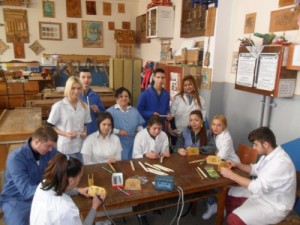In its 2 years of lifetime, there have been 10 main project activities carried out:
(1) At the beginning, there was Research conducted in the participating  countries on the different approaches to ‘work-based training’ within the transition process from school to work. One focus of the research was laid on the different national transition settings ranging from school-orientated vocational preparation to the dual apprenticeship system. The other focus was the method of work-based training itself since – regardless the specific institutional system – all approaches face the same challenge: how to combine theory and practice learning effectively in order to overcome long standing learning barriers. All partners were involved in this activity and conducted the research in their country.
countries on the different approaches to ‘work-based training’ within the transition process from school to work. One focus of the research was laid on the different national transition settings ranging from school-orientated vocational preparation to the dual apprenticeship system. The other focus was the method of work-based training itself since – regardless the specific institutional system – all approaches face the same challenge: how to combine theory and practice learning effectively in order to overcome long standing learning barriers. All partners were involved in this activity and conducted the research in their country.
(2) The findings of the research were summarized in an Overview on the different national transition systems and their approaches to ‘work-based training’. The work pack leader for this activity was the Maltese partner.
(3) Right from the beginning, the Project Website was set up to inform on the objectives of the project, on the partners and their expertise, on the work plan and schedule, on the results of the transnational meetings, and last but not least on the progress of the work with the possibility for the download of products. Work pack leader was the Italian partner.
(4) The core activity of the partnership was the implementation of an Online Survey on WBT approaches addressed to the relevant stakeholders (teachers, trainers/instructors and young learners). An appropriate questionnaire was developed, asking the stakeholders to make judgments on the strong and the weak points of WBT methods in use. The questionnaire was available in all partner languages. Work pack leader for the survey was the Romanian partner.
 (5) Following, Interviews with the three stakeholder groups were conducted in summer 2016 by each partner in its own country. Each partner collected around 20 interviews from each of the three groups, making a total of 60 interviews by each partner. This finally led to 562 interviews in total – producing enough data to form our conclusions.
(5) Following, Interviews with the three stakeholder groups were conducted in summer 2016 by each partner in its own country. Each partner collected around 20 interviews from each of the three groups, making a total of 60 interviews by each partner. This finally led to 562 interviews in total – producing enough data to form our conclusions.
(6) The collected data were summarized in a Report, documenting the findings derived from the surveys. The report includes statistical data, demonstrative charts and a summary on the strong and weak points of WBT in use in the participating countries. Work pack leader for this activity was the Swedish partner.
(7) The Online Survey led to the intellectual output, the ‘Manual on Work-based Training‘ as core product of the project. The Manual was designed to be a useful guide for teachers and trainers who want to get acquainted with different approaches and methods of ‘work-based training’. The Manual summarizes the findings from the overview and the online survey and focuses on numerous Examples of Good Practices. All partners contributed to the Manual. The overall responsibility in this case lied with the Bulgarian partner.
(8) The project was monitored by evaluations carried out  after each transnational meeting that marked the completion of each workload and the moving to the next stage. The monitoring was done by the Turkish partner, whereas the final Evaluation at the end of the project was carried out by the Portuguese partner who examined the indicators for success of the project, thus assessing its achievements and outcomes.
after each transnational meeting that marked the completion of each workload and the moving to the next stage. The monitoring was done by the Turkish partner, whereas the final Evaluation at the end of the project was carried out by the Portuguese partner who examined the indicators for success of the project, thus assessing its achievements and outcomes.
(9) The Dissemination of results via local/regional, national and international network channels was the task of all partners. The overall responsibility however lied at the Slovenian partner.
(10) The project ended with a Final Report, documenting all the activities undergone and the achievements made. Work pack leader in this case was the German partner as coordinating organisation.
